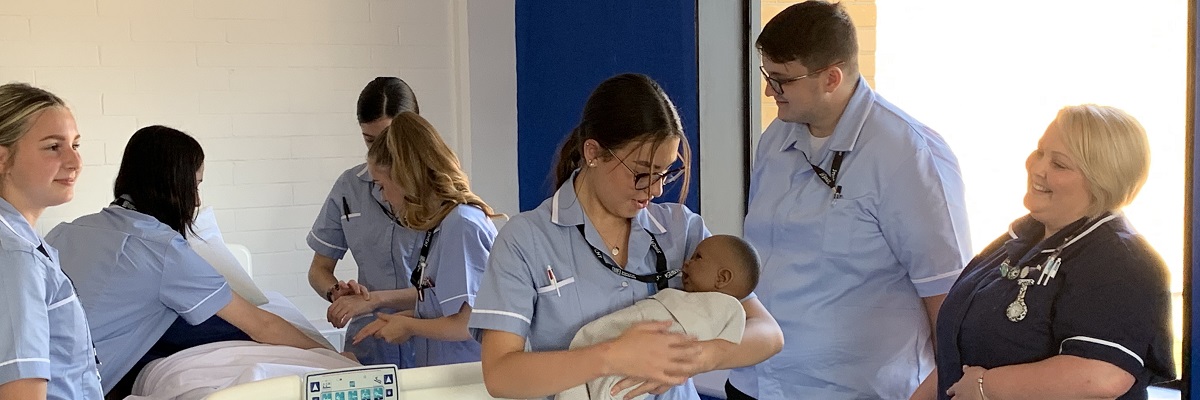

|
||||||
Its hard to imagine a more dynamic, fast changing sector than nursing and healthcare in the UK. Nurses act as leaders, carers and clinicians, taking responsibility for the care they provide to patients.
This new T Level qualification is an exciting full time course which has been designed in partnership with businesses and employers.
It is aimed at giving you the knowledge and skills to move into a career in nursing or nursing-related careers. It is designed to enable you to progress to employment or Apprenticeships in hospitals or healthcare settings or to move on to studying in Higher Education.
This course covers:
Five GCSEs grade 4 or above and grade 5 in Mathematics, English Language and Double or triple Science. Alternatively, you can also complete Level 2 Health and Science (Pre T level) achieving a distinction in the Science aspect alongside grade 4 in GCSE Mathematics and English.
In Year 1 you will cover all of the underpinning knowledge required to work in the healthcare sector. You will learn about providing person-centred care and care values, health and wellbeing including recognising the signs and symptoms of health deterioration and infection control and prevention.
The units studied are:
– Working within the Health and Science Sector
– Health, Safety and Environmental regulations in the Health and Science sector
– Managing information and data within the Health and Science sector
– Good Scientific and Clinical Practice
– Core Science concepts (Including Anatomy and Physiology and Diseases and Disorders)
– Further Science including Biology, Chemistry and Physics
– The Healthcare sector
– Providing person-centred care
– Health and wellbeing
– Health and Safety regulations applicable in the Healthcare sector
– Infection prevention and control in health specific settings.
In Year 2 you can choose to specialise in one of four Occupational Specialisms:
Adult Nursing :
You will learn about clinical tasks carried out on adults including taking physiological measurements, applying wound dressings, collecting specimens and monitoring hydration levels. You will learn about the different types of monitoring and emergency equipment used in healthcare settings and how to use and maintain this equipment. You will learn how to support adults in activities of daily life such as nutrition, hydration and hygiene and you will learn about the different roles of carers including supporting adults with dementia and end of life care. Many of these lessons will take place in our new classrooms set up as hospital-style wards and these sessions will be supplemented by visits to local universities that offer nursing degrees so that you can access state-of-the-art nurse training equipment.
Mental Health Nursing:
If you choose this specialism, you will learn about the different environments that the mental health team may provide care including hospitals, care homes and prisons. You will learn how to build effective relationships with service users and different communication methods relevant to mental health situations. You will learn about different types of mental health conditions, symptoms and treatment options. You will be taught how to record and report information in mental health settings and how to undertake a risk assessment and risk management with individuals with mental health needs. You will also learn about mental wellbeing including types of poor mental wellbeing, strategies and skills used to promote good mental wellbeing and specialist support available. Many of these lessons will take place in our new classrooms set up as consultation rooms and hospital-style wards and these sessions will be supplemented by visits to a local university that specialisein mental health nursing degree programmes.
Paediatric Nursing:
With this specialism, you will learn about legal policy and service frameworks around working with children. You will learn about clinical tasks relevant to working with children and young people including taking physiological measurements, applying wound dressings, collecting specimens and monitoring hydration levels. You will learn about safe moving and handling techniques when working with this age group and you will learn about the different types of monitoring equipment used in healthcare settings and how to use and maintain this equipment. You will be taught how to provide care and support to both children and young people who have clinical or therapeutic treatment as well as supporting their families. The course will also cover stages of child development, common childhood illnesses and long-term and life-limiting conditions and end of life care. Many of these lessons will take place in our new classrooms set up as hospital-style wards and these sessions will be supplemented by visits to local universities that offer nursing degrees so that you can access state-of-the-art nurse training equipment.
Midwifery:
In our brand new birthing centre suite you will be learning about how to care for women from the early stages of pregnancy right up until birth and the early days with a newborn. You will learn about the physiological and emotional changes that happen during pregnancy, the birthing process, and how to support new mothers with caring for their babies.
This course will be taught in a combination of learning environments. Some lectures will take place in science laboratories whilst others will take place in state-of-the-art facilities set up as hospital wards and healthcare settings. High-tech medical and clinical equipment will be used to enable you to understand the range of equipment used by nurses and other healthcare professionals and you will learn how to use this equipment yourself.
Externally assessed exam, industrial placement (315 hours), employer set project and synoptic assessment in a healthcare setting.
You will be required to purchase a uniform.
On completion of this course, you will be able to go directly into employment as a nursing associate or healthcare assistant. You could also undertake a nursing degree Apprenticeship. Alternatively, you could go on to study in Higher Education in degrees such as adult or paediatric nursing, midwifery or mental health nursing.